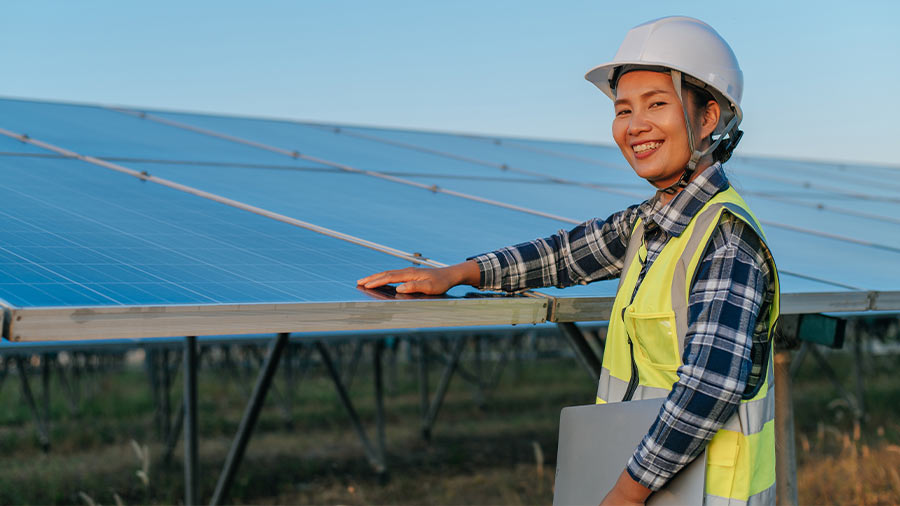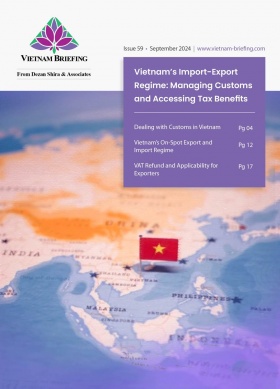Industrial Zones in Vietnam: 2025-2030 Growth Outlook
With over 400 planned industrial zones and an occupancy rate exceeding 80 percent, Vietnam’s industrial real estate market is positioned for substantial growth in 2025. Looking ahead, various development plans are set to transform the landscape of its industrial zones through 2030, as Vietnam seeks to strengthen its status as a key production hub in Southeast Asia.
In its recent report, Vietnam’s Ministry of Planning and Investment (MPI) highlighted that the industrial real estate market is poised for optimistic growth in 2025, driven by a significant increase in supply. Notably, several major industrial zone projects received investment approvals in the first month of the year, including:
- Hac Dich Industrial Park (Ba Ria – Vung Tau) – 450 hectare;
- Phuoc Binh 2 Industrial Park (Dong Nai) – 287 hectares;
- Duc Hoa III – SLICO Industrial Park (Long An) – 200 hectares;
- Phase 2 of Nam Tan Uyen Industrial Park (Binh Duong) – 345 hectares; and
- Binh Giang Industrial Park (Hai Duong) – 245 hectares.
Vietnam currently has over 400 planned industrial zones, with approximately 300 already in operation, boasting an average occupancy rate of over 80 percent. Key provinces and cities such as Binh Duong, Dong Nai, Bac Ninh, Hai Phong, and Long An continue to lead in attracting industrial investment.
Looking ahead, 2025 is expected to build on the sector’s growth momentum from 2024, further strengthening Vietnam’s position as Southeast Asia’s next major production hub. This article explores new opportunities for investors to diversify and expand their production bases in the country.
Vietnam’s industrial real estate performance in 2024
CBRE, a global leader in commercial real estate services and investments, reported that Vietnam’s industrial zones maintained exceptionally high average occupancy rates in 2024. The northern region recorded an 80 percent occupancy rate, while the southern region achieved 89 percent.
In the north, industrial zones absorbed over 400 hectares of land, driven by strong transactions in sectors such as electronics and electric vehicles. In contrast, the south experienced a 52 percent decline in absorption, with only 265 hectares occupied—significantly lower than in 2023. Key transactions in the southern region were concentrated in Ba Ria – Vung Tau and Long An provinces.
On rental prices, northern industrial zones continued to close the gap with their southern counterparts, as key markets like Hai Duong and Hai Phong saw price increases. By the end of 2024, the average rental price in northern industrial zones is projected to reach US$137 per square meter for the remaining lease term, marking a 4.2 percent year-on-year increase. Meanwhile, the average rental price in the south reached US$175 per square meter, reflecting a 1.4 percent rise from the previous year.
FDI inflows to drive industrial real estate development
Foreign direct investment (FDI) inflows are expected to remain a key driver of Vietnam’s industrial real estate sector, fueled by increasing interest from technology firms.
According to Savills Hanoi’s latest report on industrial real estate, Vietnam’s total industrial land area now exceeds 38,200 hectares, spread across 203 active industrial parks, marking a 5 percent increase from the previous year. A Savills representative highlighted that Vietnam is emerging as a strategic destination for major tech firms due to its favorable geographical position within the global supply chain. Additionally, rising investments in high-tech projects and R&D centers are driving greater demand for industrial infrastructure and factory space, further accelerating the sector’s growth.
While details of the implementation plan remain undisclosed, NVIDIA’s decision to establish a Vietnam-based research and development (R&D) center underscores the country’s ability to host high-tech production lines, strengthening investor confidence. These high-quality investments will not only enhance Vietnam’s industrial zone capabilities but also expand opportunities for modern infrastructure development and supporting service industries.
Additionally, Vietnam’s accelerated infrastructure projects will improve industrial real estate connectivity with essential logistics routes and hubs. Leading developers such as Frasers, Logos, and IDEC are expanding their portfolios of ready-built factories (RBF) and warehouses, featuring modern infrastructure and high standards tailored to the stringent requirements of high-tech sectors, particularly semiconductors.
Development plans for Vietnam’s industrial zones to 2030
According to the Vietnam National Real Estate Association (VNREA), Vietnam’s industrial real estate sector is experiencing significant growth, driven by changes in global supply chains and the government’s focus on investment policies. This upward trend is seen nationwide as numerous localities implement plans for new industrial zone development or expansion, aiming to meet new investment demands and enhance local competitiveness.
Bac Giang was the first locality to have its planning approved on February 17, 2022. By December 31, 2024, Ho Chi Minh City (HCMC) was the last of the 63 localities to finalize its planning approval for the 2021-2030 period, with a vision extending to 2050. According to these new plans, many cities and provinces are looking to attract investment and develop industrial zones to position themselves ahead of the production relocation curve.
By 2030, Vietnam is set to establish 221 newly planned industrial zones, expand land allocations for 76 existing zones, and revise planning for 22 others. This expansion is not limited to traditional industrial hubs but is also extending to emerging localities, promoting more balanced industrial development across the country.
|
List of Vietnam Localities with New Development Plans for Industrial Zones |
||
|
Province/city |
Number of industrial zones |
Total area (ha) |
|
Quang Ninh |
16 |
11,974.64 |
|
Hai Phong |
20 |
7,034.12 |
|
Quang Nam |
15 |
6,557.03 |
|
Hung Yen |
13 |
4,788.10 |
|
Binh Dinh |
8 |
4,344.77 |
|
Bac Giang |
20 |
3,789.00 |
|
Thanh Hoa |
11 |
2,853.49 |
|
Dong Nai |
10 |
2,840. 40 |
|
Thua Thien Hue |
3 |
2,640.00 |
|
Ho Chi Minh City |
10 |
2,465.00 |
|
Hoa Binh |
8 |
2,139.00 |
|
Binh Thuan |
4 |
1,954.57 |
|
Ha Nam |
6 |
1,915.00 |
|
Dong Thap |
3 |
1,800.00 |
|
Hau Giang |
7 |
1,741.00 |
|
Vinh Phuc |
12 |
1,652.34 |
|
Thai Nguyen |
4 |
1,599.00 |
|
Hanoi |
5 |
1,517.00 |
|
Lao Cai |
4 |
1,207.00 |
|
Da Nang |
4 |
1,151.97 |
|
Yen Bai |
4 |
1,025.00 |
|
Phu Yen |
5 |
1,019.00 |
|
Ben Tre |
4 |
853.20 |
|
Nam Dinh |
7 |
836.80 |
|
Ninh Thuan |
1 |
827.20 |
|
Gia Lai |
4 |
651.00 |
|
Thai Binh |
2 |
630.37 |
|
Cao Bang |
3 |
450.00 |
|
Ca Mau |
1 |
343.00 |
|
Kon Tum |
1 |
218.24 |
|
Tuyen Quang |
6 |
150.00 |
|
Total |
221 |
72,967.24 |
|
Source: VNREA |
||
|
List of Vietnam Localities with Plans for Industrial Zone Expansion |
||
|
Province/city |
Number of industrial zones |
Total area (ha) |
|
Binh Thuan |
6 |
4,897.43 |
|
Nghe An |
8 |
3,864.00 |
|
Ba Ria – Vung Tau |
4 |
3,850.00 |
|
Ha Tinh |
11 |
3,536.00 |
|
Dong Thap |
7 |
3,388.00 |
|
Khanh Hoa |
10 |
3,320.00 |
|
Binh Dinh |
3 |
1,845.96 |
|
Quang Ngai |
2 |
1,312.00 |
|
Bac Giang |
3 |
1,245.00 |
|
Ninh Thuan |
3 |
855.27 |
|
Son La |
5 |
747.35 |
|
Soc Trang |
4 |
703.00 |
|
Dong Nai |
4 |
392.28 |
|
Quang Nam |
1 |
298.10 |
|
Yen Bai |
1 |
195.89 |
|
Ha Nam |
2 |
114.00 |
|
Bac Kan |
1 |
80.70 |
|
Ben Tre |
1 |
50.80 |
|
Total |
76 |
30,685.78 |
|
Source: VNREA |
||
|
List of Vietnam Localities with Adjusted Plans for Industrial Zones |
||
|
Province/city |
Number of industrial zones |
Total area (ha) |
|
Quang Binh |
10 |
2,285.00 |
|
Hanoi |
6 |
962.90 |
|
Ha Giang |
2 |
377.00 |
|
Thai Nguyen |
2 |
975.00 |
|
Dong Nai |
1 |
27.20 |
|
Ca Mau |
1 |
45.45 |
|
Total |
22 |
4,672.55 |
|
Source: VNREA |
||
Conclusion
Vietnam’s industrial real estate sector is poised for significant growth in 2025, fueled by increased supply and prospective demand from global production diversification. With localities continuously expanding and modernizing industrial zones, the future of industrial real estate in Vietnam appears promising, presenting ample opportunities for investors and businesses.
About Us
Vietnam Briefing is published by Asia Briefing, a subsidiary of Dezan Shira & Associates. We produce material for foreign investors throughout Asia, including ASEAN, China, and India. For editorial matters, contact us here and for a complimentary subscription to our products, please click here. For assistance with investments into Vietnam, please contact us at vietnam@dezshira.com or visit us at www.dezshira.com.
Dezan Shira & Associates assists foreign investors throughout Asia from offices across the world, including in Hanoi, Ho Chi Minh City, and Da Nang. We also maintain offices or have alliance partners assisting foreign investors in China, Hong Kong SAR, Dubai (UAE), Indonesia, Singapore, Philippines, Malaysia, Thailand, Bangladesh, Italy, Germany, the United States, and Australia.
- Previous Article Vietnam’s Amended Pharmaceutical Law: Navigating the Key Changes
- Next Article Vietnam’s 2025 Job Market: Opportunities and Challenges































